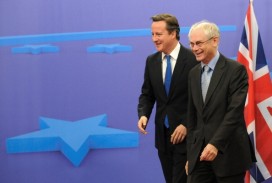The Tories are having great fun mocking Nick Clegg’s opposition to an EU referendum, pointing out that the Lib Dems went into the last election promising a referendum of their own. The Lib Dems in turn, point out that the wording of their manifesto actually mirrors what the coalition has put into law, namely that there should be:
an in/out referendum the next time a British government signs up for fundamental change in the relationship between the UK and the EU
But the Lib Dems made a huge issue of it, even walking out of the Commons in 2008 when speaker Michael Martin refused to let the party bring an amendment calling for a referendum. As the guardian’s Nick Watt points out, Nick Clegg said at the time: Read more








 Older entries
Older entries
 Jim Pickard
Jim Pickard Kiran Stacey
Kiran Stacey